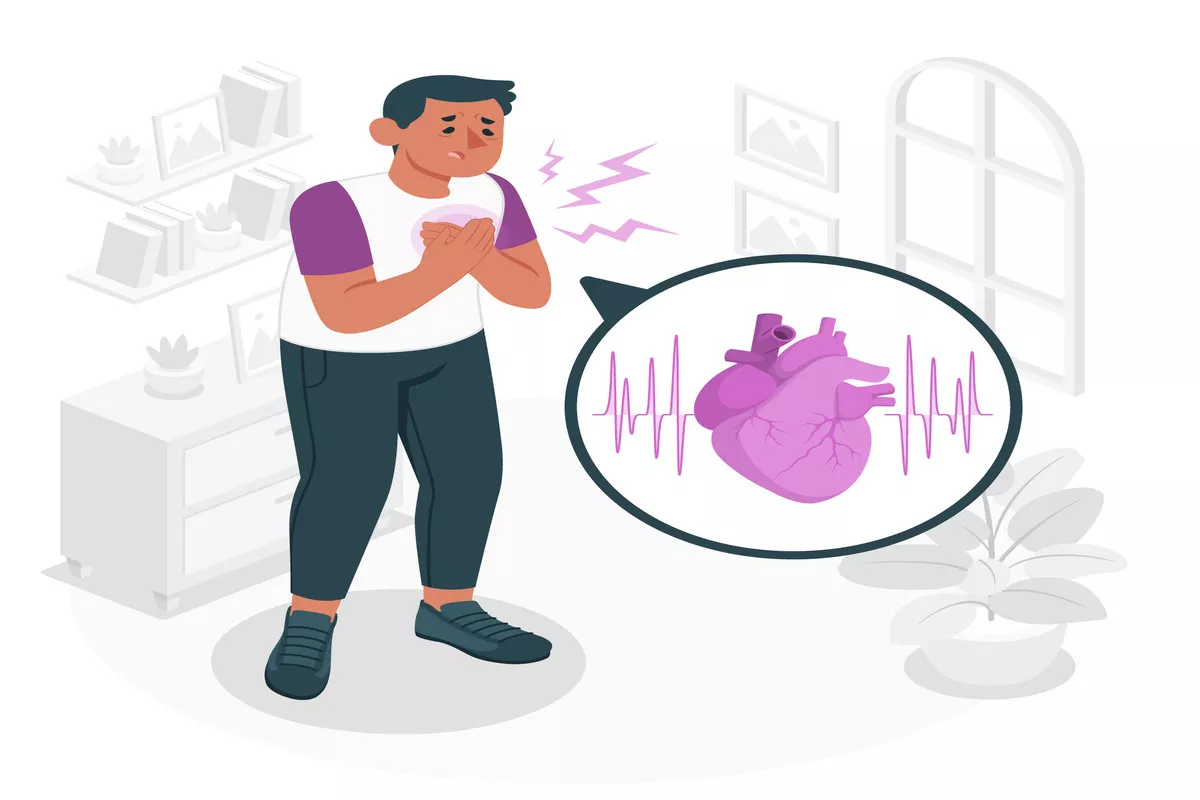Introduction
Heart attacks are no longer confined to the elderly; they're happening at younger ages. Since 2020, studies have shown that nearly 50% of heart attack patients are under 40. In Eastern India, 20-30% of heart attack cases now involve individuals in this age group. Nationally, about half of all heart attacks occur in men under 50. This alarming trend highlights the need for awareness and preventive measures. Young adults often dismiss the possibility of heart disease, attributing it to older populations. However, factors like stress, unhealthy lifestyles, and genetic predispositions are putting them at significant risk. Understanding the causes and taking proactive steps can help prevent heart attacks and safeguard long-term heart health.
Understanding Heart Attacks in Young Adults
A heart attack occurs when the blood supply to the heart is blocked, usually due to a clot or plaque buildup in the coronary arteries. This deprives the heart of oxygen, leading to tissue damage or death.
While heart attacks were traditionally linked to aging, the rise in cases among younger people suggests that lifestyle and environmental factors play a crucial role. The modern sedentary lifestyle, increased stress levels, and poor dietary habits contribute significantly to this trend.
Risk Factors Specific to Younger Individuals
Several key risk factors make young adults more susceptible to heart attacks:
1. Sedentary Lifestyle: Many young adults spend long hours sitting at desks, watching screens, or avoiding physical activity. Lack of exercise weakens the heart and leads to weight gain, high blood pressure, and poor circulation.
2. Unhealthy Diet Choices: Fast food, processed snacks, and sugar-laden beverages are common dietary staples, leading to high cholesterol, obesity, and diabetes—major contributors to heart disease.
3. Smoking and Alcohol Consumption: Tobacco use damages blood vessels and increases the risk of blood clots. Similarly, excessive alcohol consumption raises blood pressure and contributes to irregular heart rhythms.
4. Chronic Stress and Mental Health Issues: The pressures of career growth, financial struggles, and personal challenges can lead to chronic stress, which negatively affects heart health. Stress triggers the release of cortisol and adrenaline, which, over time, contribute to high blood pressure and inflammation.
5. Genetic Predisposition: A family history of heart disease increases the likelihood of experiencing a heart attack at a young age. If close relatives have had heart conditions, regular medical check-ups and lifestyle modifications become essential.
Preventive Measures for Heart Attack in Young Adults
Taking preventive action can significantly reduce the risk of heart disease. Here’s what young adults can do to protect their heart health:
1. Adopt a Heart-Healthy Diet: Focus on a balanced diet rich in whole grains, fruits, vegetables, lean proteins, and healthy fats. Avoid processed foods, excess sugar, and trans fats. These factors contribute to high cholesterol and obesity.
2. Moderate Exercise: To improve cardiovascular health, engage in at least 30 minutes of moderate-intensity exercise, like brisk walking, jogging, cycling, or swimming, five times a week.
3. Manage Stress Effectively: Incorporate stress-relieving practices such as yoga, meditation, deep breathing exercises, and hobbies that promote relaxation. Prioritizing mental well-being is essential for maintaining heart health.
4. Get Routine Medical Check-Ups: Regular screenings for blood pressure, cholesterol levels, and diabetes can help detect and address risk factors before they lead to a heart attack. If there’s a family history of heart disease, consulting a cardiologist is advisable.
5. Quit Smoking and Limit Alcohol Intake: Smoking cessation significantly reduces the risk of heart disease. Similarly, moderating alcohol consumption supports cardiovascular health and overall well-being.
6. Maintain a Healthy Weight: Obesity is a major risk factor for heart attacks. A balanced diet combined with regular exercise helps maintain a healthy weight and prevents related health problems.
Recognizing Early Warning Signs of a Heart Attack
Being aware of early symptoms can be lifesaving. Common signs of a heart attack include:
• Chest pain or discomfort (tightness, pressure, or squeezing sensation)
• Shortness of breath
• Symptoms such as arm, neck, jaw, and back pain
• Nausea or vomiting
• Light-headedness or dizziness
• Cold sweat
There is a risk of severe complications or even death if any of these symptoms appear suddenly or develop gradually over time. Acting quickly and seeking medical help is vital when these symptoms occur.
A Call for Urgent Action
These stories paint a grim picture. The rising cases of heart attacks among young individuals demand immediate attention. Lifestyle changes, excessive stress, dietary habits, lack of routine check-ups, and unrecognized underlying conditions could all be contributing factors. The growing crisis emphasizes the need for better awareness, regular medical screenings, and a proactive approach to heart health from an early age.
It's time for young adults to wake up to the reality that heart disease is not just a concern for the elderly. Prevention, awareness, and timely medical interventions are crucial to reversing this distressing trend. Ignoring the warning signs could prove fatal. Let these real-life cases serve as a wake-up call for everyone to take heart health seriously—before it's too late.







